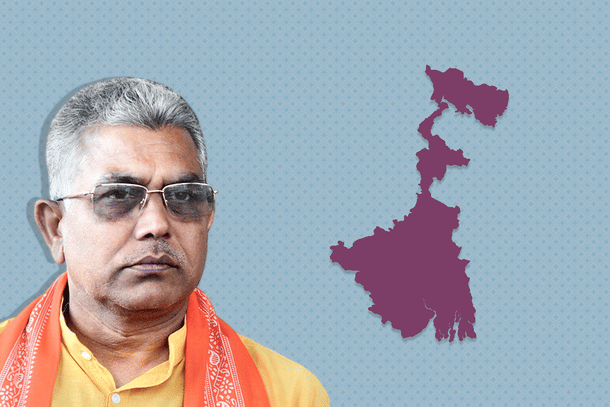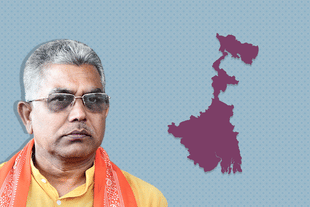Politics
Why Former Bengal BJP Chief Dilip Ghosh Has Been Reprimanded By Party
Jaideep Mazumdar
Jun 01, 2022, 03:49 PM | Updated 03:49 PM IST
Save & read from anywhere!
Bookmark stories for easy access on any device or the Swarajya app.


Former Bengal Bharatiya Janata Party (BJP) chief Dilip Ghosh, who has often created controversies and landed the party in embarrassments with his intemperate statements and behaviour, has been reprimanded by the party central leadership.
BJP national general secretary Arun Singh sent a letter (read this) to Ghosh on Monday (30 May) evening asking him to refrain from publicly speaking out against senior BJP functionaries in Bengal and outside the state.
Singh, who made it clear in his letter that he was issuing the reprimand on the directions of BJP national president J P Nadda, said that many of Ghosh’s “statements and outburst” have embarrassed the party central leadership. He regretted that Ghosh had continued to speak out against his party colleagues despite being asked not to do so by senior leaders of the party.
Ghosh’s statements against not only his party colleagues, but also others, including Bengal Chief Minister Mamata Banerjee, had put the saffron party in a spot many times in the past.
But it was his recent statements against the state party leadership that riled the BJP central leaders. Ghosh, who was replaced with Balurghat Lok Sabha MP Sukanta Majumdar after the BJP failed to unseat Banerjee from power last year, made disparaging remarks against his successor.
After the BJP’s defeat in the bypolls to the Asansol Lok Sabha seat, Ghosh criticised Majumdar for being an “inexperienced” person who had “come recently”. Ghosh had said that the people of Bengal had lost confidence in the BJP and the party is suffering from “lack of confidence and planning”.
Ghosh also questioned the removal of “able persons” from “leadership roles”. Ghosh’s outburst emboldened others in the party to criticise senior functionaries, including Majumdar. The latter defended himself by pointing out that Ghosh was also inexperienced when he was made the state unit president in 2015, six months after he was ‘loaned’ to the party from the RSS.
Ghosh was appointed a national vice-president of the party after his removal from the post of Bengal party president. That in itself was meant to be a strong signal to him to stay away from party affairs in Bengal.
But Ghosh continued to behave like the state party chief and issued statements to the media about party affairs in Bengal. Within the party, he is said to have been fanning dissent against state party president Majumdar and a few others.
Ghosh stands accused of encouraging factionalism and urging his loyalists to defy Majumdar. State BJP leaders say Ghosh has been covertly opposing Suvendu Adhikari, who he views as his prime rival, and has been trying to derail Adhikari.
Ties between Ghosh and Adhikari, who joined the BJP from the Trinamool, have been frosty. Ghosh has often been openly critical of those who crossed over to the BJP from the Trinamool before last year’s assembly polls.
Adhikari, well-versed in politics unlike Ghosh, also scores over the former state party chief in organisational skills and public outreach. Being a seasoned politician, Adhikari criticises the Trinamool and Banerjee without being offensive like Ghosh.
That’s why Ghosh, who had harboured ambitions of becoming the chief minister of the state, resents Adhikari who he sees as his primary rival. The BJP central leadership has been flooded with a deluge of complaints against Ghosh.
Last week, Ghosh was assigned the task of strengthening the party organisation at the booth level in some states except Bengal. That, again, was meant to be a strong signal to him to stay away from party affairs in Bengal.
But Ghosh chose to ignore the hint and publicly asserted that he would spend half the month in Bengal and the remaining in the states that have been assigned to him. That was viewed as a show of defiance against the party central leadership.
That is what prompted the BJP central leadership to issue a public reprimand to Ghosh. Ghosh was told that his criticism of senior state functionaries “only hurt and harm the party” and “create deep disaffection, unrest and alienation among party ranks”. Ghosh was also told that his conduct is “unacceptable” and had caused “deep anguish” to the party central leadership.
Such a public and sharp rap on the knuckles of a senior party functionary — Ghosh is one of the dozen-odd national vice presidents of the party — is quite unprecedented. But far from chastening Ghosh, the strong public reprimand could well get his goat and turn him even more defiant.
Those who know Ghosh say that he does not take kindly to being disciplined. Even mild criticism from his party seniors is unacceptable to him. Thus, they say, the chances of Ghosh defying the party central leadership are quite high.
Ghosh also has the support of one powerful section of the RSS in Bengal. He was an RSS pracharak before ‘loaned’ to the BJP a little over seven years ago and has very strong links with senior RSS functionaries.
A section of the RSS in Bengal has been critical, though in private, about the entry of a large number of leaders and workers from the Trinamool to the BJP. They had criticised the BJP’s ‘open door’ policy and had warned the BJP leadership against indiscriminate induction of Trinamool functionaries before the assembly polls.
This indiscriminate induction of Trinamool turncoats into the saffron party, which also had the blessings of the BJP central leadership, is seen as one of the reasons behind the BJP’s failure to achieve its ambitious goal of coming to power in the state.
Dilip Ghosh, say BJP leaders, knows that his criticism of BJP state functionaries finds a resonance in the RSS. And he also believes that the RSS will protect him. That’s why he is likely to remain defiant and, if pushed further, may even revolt.
The best solution, say many BJP functionaries, is to repatriate Ghosh to the RSS. There have been many instances of the BJP sending its functionaries, including those in senior ranks, back to the RSS. It will do the BJP in Bengal a lot of good if Ghosh is also made to return to his parent organisation before he does any harm to the party.
Jaideep Mazumdar is an associate editor at Swarajya.





